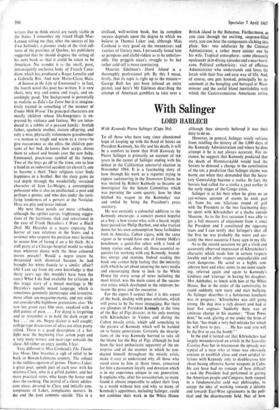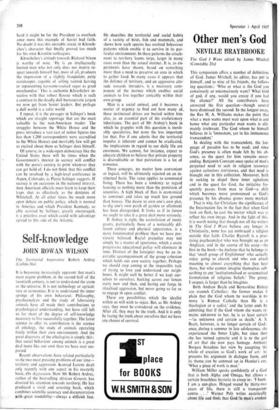With Salinger
LORD HARLECH
With Kennedy Pierre Salinger (Cape 36s) To all those who have long since abandoned hope of keeping up with the flood of books on President Kennedy, his life and his death, it will be a comfort to know that With Kennedy by Pierre Salinger is primarily an account of ten years in the career of Salinger ending with his defeat in the Californian senatorial election in November 1964. It is a fascinating story of how through his work as a reporter trying to expose racketeering in the Teamsters Union, he was invited by Robert Kennedy to become an investigator for the Senate Committee which was pursuing the same quarry; how he thus hitched his wagon to the Kennedys' star and ended by being the President's press secretary.
He was certainly a colourful addition to the Kennedy entourage: a concert pianist hopeful as a boy; a bon viveur who, with a beard, might have passed for Philip Harben, and who tracked down for his own consumption those forbidden fruit in America, Cuban cigars, with the same vigour as he would have one of Jimmy Hoffa's henchmen; a quick-fire talker with a fund of funny stories and, above all, those essential re- quisites for working with any Kennedy, bound- less energy and stamina. Indeed reading this book one cannot help feeling that the intensity with which he set about securing the news media and encouraging them to look to the White House for every scrap of news including the most trivial, was the main cause of the succes- sive crises which developed in the relations be- tween the press and the executive.
For the expert I suspect that it is this aspect of the book, dealing with press relations, which will prove to be the most interesting. But there are glimpses of President Kennedy at the time of the Bay of Pigs disaster, in his only meeting with Khrushchev in Vienna and during the Cuban missile crisis, which add something to the picture of Kennedy which will be handed on to future generations. Certainly the descrip- tions of the way Kennedy hurried to take all the blame for the Bay of Pigs although he had been the least enthusiastic supporter of the en- terprise and of the manner in which he con- ducted himself throughout the missile crisis, make it easy to understand why all those who stood close to him at those times, conceived for him a passionate loyalty and devotion which is in my experience unique in our generation. It explains why, after his assassination, so many found it almost impossible to adjust their lives to a world without him and why so many of Kennedy's appointees, including Salinger, could not continue their work in the White House
although they sincerely believed it was their duty to do so.
However, in general, Salinger wisely refrains from retelling the history of the 1,000 days of the Kennedy Administration and where he does attempt it he is not always accurate. For in- stance, he suggests that Kennedy predicted that the death of Hammarskjold would lead the Soviets to demand a change in the constitution of the UN; a prediction that Salinger claims was borne out when they demanded that the Secre- tary Generalship become a troika. In fact, the Soviets had called for a troika a year earlier in the early stages of the Congo crisis.
Salinger is at his best when he gives us an eye-witness account of events he took part in, from his one hilarious round of golf with the President to the two fascinating days he spent with Khrushchev at a dacha outside Moscow. As to the first occasion I was able to get a full measure of enjoyment from it since the President and I constituted the opposing team and I can testify that Salinger's shot off the first tee was probably the worst and cer- tainly the most eccentric I have seen in my life.
As to the second occasion we get a vivid and accurately observed impression of Khrushchev's character which made him in certain respects lovable and in other respects unpredictable and even dangerous. He acted as a highly con- siderate host and what seems to me most touch- ing, referred again and again to Kennedy's kindness and `courage' in having his daughter, Mrs Adzhubei, to lunch with him at the White House, But in the midst of the conviviality he could suddenly turn nasty and start bullying. As Salinger describes it a boisterous luncheon was in progress: `Khrushchev was still going strong. He dug into a rich dessert and had at least five cognacs. Suddenly there was an ominous change in his manner: "Your Presi- dent," he said, glaring at me under the brim of his hat, "has made a very bad mistake for which he will have to pay. . . . He has said you will be the first to use the bomb."'
In the end it turned out that Khrushchev had largely misunderstood an article in the Saturday Evening Post but in microcosm the episode was typical of a man who at times was obviously anxious to establish close and even cordial re- lations with Kennedy only to double-cross him about basing offensive Soviet weapons in Cuba. He can have had no concept of how difficult a task the President had performed in getting the American people and Congress, both steeped in a fundamentalist cold war philosophy, to accept the idea of working towards a ddtente and towards East-West agreements in the poli- tical and the disarmament field. Nor of how
hard it might be for the President to overlook once more this example of Soviet bad faith.
No doubt it was this unstable streak in Khrush- chev's character that finally proved too much for his own Kremlin colleagues.
Khrushchev's attitude towards Richard Nixon is worthy of note. He is an intellectually limited man who not only does not inspire re- spect towards himself but, most of all, produces the impression of a slightly fraudulent, petty storekeeper, capable of selling tainted herring or representing kerosene-soaked sugar as good merchandise.' This is authentic Khrushchev in- vective with that robust flavour which is such a contrast to the deadly dull bureaucratic jargon we now get from Soviet leaders. But perhaps a dull world is a safer world.
I repeat, it is the passages in Salinger's book which are straight reportage that are the most valuable to the non-American reader. The struggles between the White House and the press introduce a vast cast of minor figures (no less than 1,200 correspondents were accredited to the White House) and inevitably few will get as excited about them as Salinger does himself.
Of course, in a wide-open democracy like the United States there will be times when the Government's interest in secrecy will conflict with the press's anxiety to print whatever they can get hold of. I do not think that this conflict can be resolved by a high-level conference in Aspen, Colorado, as Pierre Salinger suggests. If secrecy is on occasions in the national interest, then American officials must learn to keep their traps shut as effectively as the denizens of Whitehall. At all other times the much more open debate on public policy, which is normal in America and which President Kennedy, so ably assisted by Salinger, greatly encouraged, is a priceless asset which could with advantage spread to this side of the Atlantic.































 Previous page
Previous page